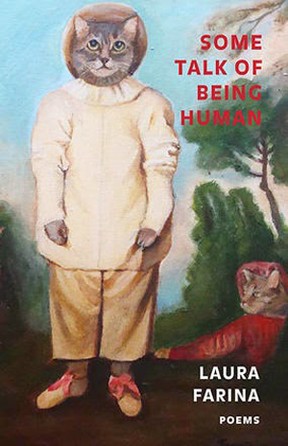Lets Be Human Again Keven Breton
Let's go home: Laura Farina's Some Talk of Being Human, reviewed
Laura Farina keeps her surroundings fresh in her new poetry collection, Some Talk of Being Human.
Reviews and recommendations are unbiased and products are independently selected. Postmedia may earn an chapter commission from purchases made through links on this page.
Some Talk of Being Human
Laura Farina
A Stuart Ross Volume
lxxx pgs; $17.00
The championship of Laura Farina'due south 2nd poetry collection is deliberately modest.
Some Talk of Being Humancarefully chronicles the minutiae of everyday life every bit the speaker defines her sense of belonging beyond many familiar Canadian landscapes—Toronto, Banff, Ottawa, South Bend and Vancouver. The stuffing of processed cheese into childhood mouths in dank basements is remembered, trips to Florida brimful in self-conscious tourist particular are taken, and quiet relationship wars are waged in cold rooms.

Farina is intent on exploring what constitutes our sense of home — a fundamentally tricky, half-personal, half-political and very human quest. The home is a physical site onto which we map memories, experiences and relationships, too as a space that shapes identities and organizes corresponding worlds into routine. To define one's dwelling is to draw boundaries between the self and others, and to designate people as residents, guests or intruders. Farina remains true to these complexities, demonstrating that dwelling house is not necessarily where the centre is every bit she spans a decade of life experience and three relationships.
The balance between domesticity and spontaneity, between existence man and acting simply a tiny flake wild, drives Farina'southward depiction of homes that are at once nurturing sanctuaries from the relentlessly cycling seasons, and passive spaces in which household objects pile up and go oppressive in their familiarity. Maps and compasses surface as guiding tools throughout the collection, reminding united states that the speaker is in a constant country of orienting herself.
Farina best describes her ain work in a passage that illustrates her ongoing lyrical obsession with doors and windows, and hints at her talent for spotlighting the intimacies of twenty-four hours-to-day relationships and moments of self-reflection:
If every birthday
could have a fleck with a door.
Someone stumbling through a door,
grabbing at its frame,
someone opening a door
to reveal something individual
but funny.
While many of these poems exercise "reveal something private/ just funny", doors and windows are employed as framing devices to lesser upshot elsewhere, threatening to seal in the speaker from the unfamiliar exterior world. In combination with frequent references to empty spaces and the heavy repetition of words like "nighttime," "silent" and "yet," potential thresholds instead become the edges of language and content that the poet is unwilling to cantankerous. The reader experiences a case of second-hand claustrophobia, a sense of beingness constrained by the poorly lit, tomb-like sites existence described.
Though Farina has a talent for juxtaposing the banality of coded romantic relationship behaviour, household objects, and pieced-together flashes of babyhood quietness with images and occasions of sudden abrupt focus, certain lines experience a little too lived-in. Words sometimes get running catalogues that fail to crack the poetic realm, such every bit when Farina writes: "Spring comes and goes similar weather. // The mail comes at noon. / The toaster toasts 1 side / of bread more than the other." These observations lack the musicality and moments of sly clarity that the best poems in this collection deliver.
Farina keeps her surroundings fresh, mining questions of place without letting the reader become also comfortable.
Her sense of language is well-nigh electrical and memorable when she embraces the dubiety of an unchartered landscape; it'southward not surprising that, in a collection that investigates the touch on of place on the developing self, the all-time work would exist in that liminal infinite of I'm-only-visiting—a plunging into territories that lack familiar items, a brushing upward against what is untamed and unordered.
Accept the lovely and succinct "Banff," for example: "In the mountains / I grow a pair of antlers. / Hang from them / my bright red coat / nevertheless dripping with pelting." Here, Farina addresses the impact of encroaching wilderness on the human psyche, while pinpointing the feeling of existence connected but non quite at home; she also evokes the experience of a boondocks that contains both the numinous and the absurdly commercial, conjuring the weird space of the manicured wild in simply five lines.
Farther exploring the tension between constructed urban being and the barbarous outdoors, Farina keeps her surroundings fresh, mining questions of place without letting the reader become too comfortable. Most memorably, she compares fungi to exit signs and attempts to locate a man'due south beard in the hierarchy of the wild. She tells us that "My grandfather warned me / about nature / where everything / is food." It's plenty to brand me wish the speaker would spend a piddling more time getting lost in the woods.
* * *
Laura Clarke won the RBC Bronwen Wallace Award, from the Writers Trust of Canada, in 2013.
Source: https://nationalpost.com/entertainment/books/laura-farina-some-talk-of-being-human

0 Response to "Lets Be Human Again Keven Breton"
Post a Comment